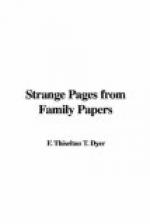Search was made for the missing man, but to no purpose, and after the excitement in the neighbourhood had abated, the matter was soon forgotten. But some time afterwards a man named Page was apprehended for sheep stealing, tried, and sentenced to be transported for life. During his imprisonment, he told divers stories of robberies and crimes, most of which turned out to be false. But, amongst other things, he wrote a letter promising that if he were released from gaol and brought to Cossey, “he would show them that, from under the willow tree, which would make every hair in their heads rise up.” The man was not released, but the river was drawn, and some sheep’s skins and sheep’s heads were found, which were considered to be the objects alluded to by Page. The search, however, was still pursued, and from under the willow tree the skeleton was fished up, evidently having been fastened down. It was generally supposed that these were the bones of the long lost Jew, who, no doubt, had been murdered for the money on his person—a crime of which Page was aware, if he were not an accomplice.
FOOTNOTES:
[47] See “Romantic Records of the Aristocracy,” 1850, I., 83-87.
[48] See “Dict. of Nat. Biog.,” VIII., 418-420; Caulfield’s “Remarkable Persons,” and Gent. Mag., 1753 and 1754.
[49] Sir B. Burke’s “Vicissitudes of Families,” first series, 270-273. Harland’s “Lancashire Legends,” 45-47. Roby’s “Traditions of Lancashire.”
[50] The tale of the noble Moringer is, in some respects, almost identical with this tradition. It exists in a collection of German popular songs, and is supposed to be extracted from a manuscript “Chronicle of Nicholas Thomann, Chaplain to St. Leonard in Weissenhorn,” and dated 1533.
CHAPTER XIV.
HONOURED HEARTS.
“I will ye charge, after
that I depart
To holy grave, and thair bury my heart,
Let it remaine ever bothe tyme and hour,
To ye last day I see my Saviour.”
—Old ballad quoted in Sir
Walter Scott’s notes
to “Marmion.”




